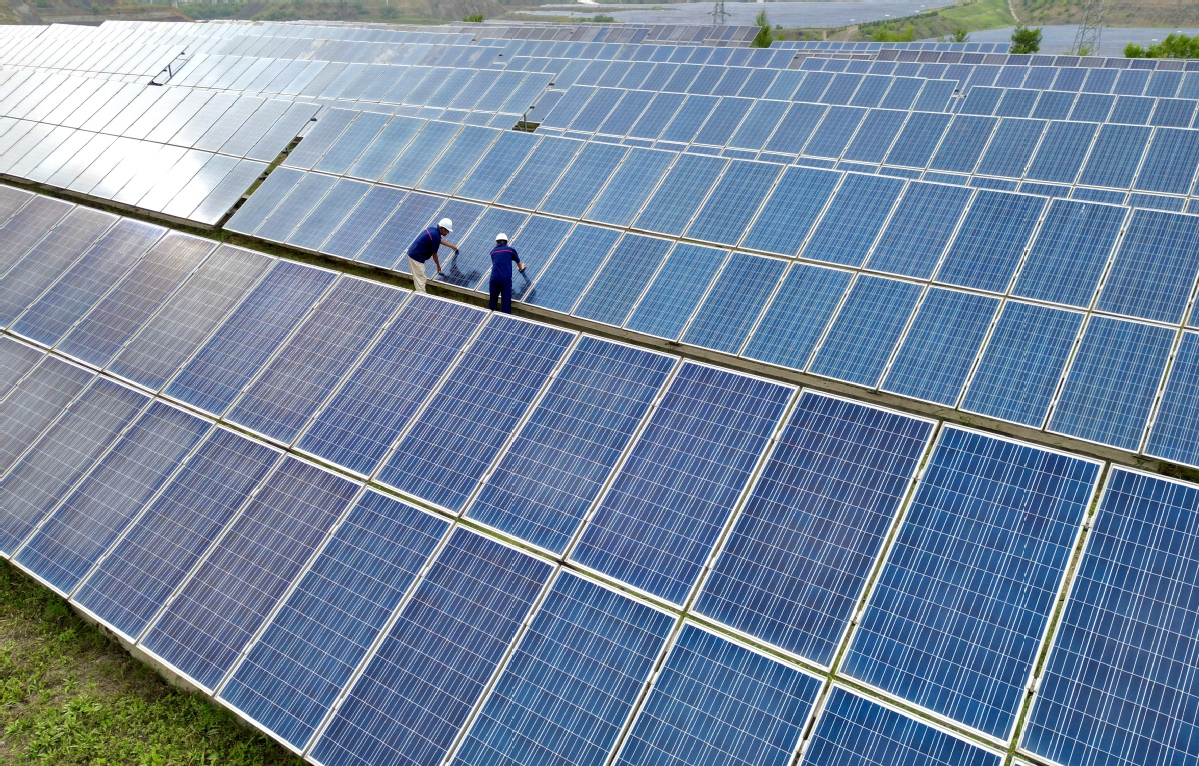Domestic support, diversified o

Technicians check photovoltaic boards at a solar power station in Yangquan, Shanxi province, on Tuesday. ZHU XINGXIN/CHINA DAILY
Asia surpassed Europe as the largest export market for Chinese solar products in the first half of this year, the China Photovoltaic Industry Association said on Thursday.
Solar modules, which took up 87 percent of total solar product exports in terms of value, saw significant growth in new markets. Pakistan became the second-largest market for Chinese module exports with its share rising to 8.9 percent in the first half from the 3.3 percent level during the same period of last year.
Saudi Arabia, which did not make it to the top 10 markets during the period last year, ranked fifth this year, according to the trade body.
European and Asian markets together accounted for over 80 percent of total module exports
"In the first six months, major global photovoltaic markets such as the United States, Europe, India, Brazil and South Africa rolled out policies that increased barriers of PV product trade, restricting the direct export of relevant Chinese products," said Wang Bohua, honorary chairman of the CPIA.
"Chinese companies' overseas production capacities also began to face trade barrier issues, such as the US halting the 'anti-circumvention' tariff exemption on four Southeast Asian countries where Chinese PV companies have production sites. Meanwhile, localization supply ratios in key markets like the US and India have significantly increased, intensifying industry competition," said Wang.
In the first half, export volumes of silicon wafers, cells and modules grew by 34.5 percent, 32.1 percent, and 19.7 percent year-on-year, respectively. However, the total export value of China's PV products, including silicon wafers, cells and modules, was about $18.67 billion, down 35.4 percent year-on-year
"Despite the substantial challenges in overseas markets, there are still numerous opportunities for Chinese solar companies. We are optimistic that in 2024, global newly installed capacity will range between 390 gigawatts and 430 GW, providing considerable market space for Chinese solar products abroad. Not only are major markets like the US, Europe, India and Brazil rapidly growing in installed capacity, but emerging markets in Latin America and the Middle East are also developing swiftly," Wang added.
"Companies should adopt a strategic approach while expanding internationally. We recommend that upstream and downstream industry chain cooperation, diversified investment and dispersed business layout be employed to mitigate the uncertainties of international expansion," he suggested
The CPIA also anticipates China's new PV installations to remain at high levels this year.
"In some regions, the requirement on renewable energy power's absorption to the grid has been eased from 95 percent to 90 percent, creating substantial installation space for PV projects. Accelerated construction of large PV stations in areas like the Gobi Desert, as well as power grids, along with increasing electrification of end-use consumption, suggest that PV installations will continue to maintain high levels in the second half of the year," Wang said.
In the first half, the domestic manufacturing scale continued to expand, with polysilicon production increasing by around 60.6 percent year-on-year to 1.06 million metric tons. Silicon wafer production grew by about 58.9 percent year-on-year to 402 GW. Cell production reached around 310 GW, up 37.8 percent year-on-year, while module production hit about 271 GW, up 32.2 percent year-on-year.
The application scale also grew, with new domestic PV installations reaching 102.48 GW, a 30.7 percent yearly increase.
However, despite the expansion, industry chain prices and manufacturing output value both declined. Prices of polysilicon and silicon wafers dropped by over 40 percent, while cell and module prices fell by more than 15 percent. The domestic PV manufacturing output value (excluding inverters) was approximately 538.6 billion yuan ($74.5 billion), down 36.5 percent year-on-year.
"To further promote consumption of solar power, we call for efforts to accelerate the construction of grids and optimize the power flow from generators to grids. Technologically, China and global grids still have the potential to accommodate more solar power, offering significant room for increasing solar power use," Wang said.
Source: By LIU YUKUN in Wenzhou, Zhejiang, July 26, 2024 [https://www.chinadaily.com.cn/a/202407/26/WS66a2fe5fa31095c51c5100cf.html]

